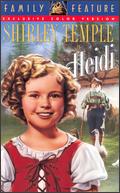Heidi
Reviewed by: Brett Willis
STAFF WRITER
| Moral Rating: | Good |
| Moviemaking Quality: |
|
| Primary Audience: | Family |
| Genre: | Drama |
| Length: | 1 hr. 28 min. |
| Year of Release: | 1937 |
| USA Release: |

| Featuring |
|---|
| Shirley Temple, Thomas Beck, Sidney Blackmer, Egon Brecher, Mady Christians, Jean Hersholt, George Humbert, Marcia Mae Jones, Greta Meyer, Pauline Moore, Mary Nash, Christian Rub, Sig Rumann, Arthur Treacher, Delmar Watson, Helen Westley |
| Director |
| Producer |
| Distributor |
This Johanna Spyri story, set in Germany and Switzerland abound 1900, is strong in its own right and comes alive with Shirley Temple in the lead (note: the movie script differs quite a bit from the novel). It’s the basic Temple “formula,” with the orphaned Heidi Kramer (Temple) being treated badly by a number of people, but having an irrepressible and infectious happiness regardless of her situation. Aunt Dete (Mady Christians), who has “cared for” Heidi, but now has a chance to work for a rich family, dumps her on the doorstep of her recluse grandfather Adolph (Jean Hersholt).
Although he’s been angry at the entire world ever since his son married against his wishes and the townspeople sided with the son, Adolph can’t resist Heidi’s charm. In a heartwarming sequence of events, his bitterness is melted away and his relationship with the townspeople is restored. There’s explicit reference to the Bible story of the Prodigal Son, and it’s assumed that everyone should have faith in God.
Just when everything seems to be going well, Aunt Dete shows up again; she and the equally nasty Fräulein Rottenmeier (Mary Nash) steal Heidi away from her grandfather and make merchandise of her for their own gain. There’s a lot of conflict, although it’s broken up with some comic relief. As we expect, everything turns out alright in the end.
The one negative element that could have been handled better is the repeated threats of selling Heidi to the Gypsies. The producers probably would have rewritten that, if they could have foreseen that the Nazis would wipe out an entire race of Gypsies during WWII. Since the story of Heidi provides no opportunity for Temple’s obligatory song and dance, these are supplied during a “dream sequence” while Heidi reads a storybook with her grandfather. Like most of Temple’s movies, this is a solid family classic.


